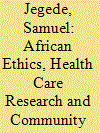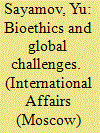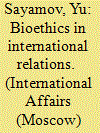|
|
|
Sort Order |
|
|
|
Items / Page
|
|
|
|
|
|
|
| Srl | Item |
| 1 |
ID:
088363


|
|
|
|
|
| Publication |
2009.
|
| Summary/Abstract |
This article discusses the appropriateness of western bioethics in the African setting. It focuses on the decision-making process regarding participation in health research as a contested boundary in international bioethics discourse. An ethnomethodological approach is used to explain African ethics, and African ethic is applied to the decision-making process in the African community. An HIV/AIDS surveillance project is used as a case study to explore the concept of communitarianism. The article argues that what exists in Africa is communal or social autonomy as opposed to individual autonomy in the West. As a result, applying the western concept of autonomy to research involving human subjects in the African context without adequate consideration for the important role of the community is inappropriate. It concludes that lack of adequate consideration for community participation in health research involving human subjects in Africa will prevent proper management and lack truly informed consent.
|
|
|
|
|
|
|
|
|
|
|
|
|
|
|
|
| 2 |
ID:
165644


|
|
|
| 3 |
ID:
165643


|
|
|
|
|
| Summary/Abstract |
THE UNITED NATIONS Educational, Scientific and Cultural Organization (UNESCO) pays special attention to bioethical issues when considering the social and ethical challenges facing humanity [6]. Bioethics, as an interdisciplinary field of knowledge at the intersection of philosophy, law, medicine, sociology, political science, demographics, and cultural and religious studies, addresses moral aspects of people's attitudes toward life and death. It comprises a wide range of socioeconomic, ethical and legal issues on the assumption that human values must not be considered separately from biological facts, and strives to develop moral and ethical norms, requirements and principles, establishing mechanisms for using scientific and technological achievements to benefit people and nature.
|
|
|
|
|
|
|
|
|
|
|
|
|
|
|
|
| 4 |
ID:
188467


|
|
|
|
|
| Summary/Abstract |
THE PRESENTATION of Biblioteka bioetiki [The Library of Bioethics] at the Ministry of Foreign Affairs of the Russian Federation offered an occasion to return to the discussion of the global challenges facing humanity amid unprecedentedly rapid and radical changes to the world and international relations. This unique 10-volume publication, prepared on the initiative of Academic Alexander Chuchalin, chairman of the Russian Committee on Bioethics, draws upon the creative legacy of outstanding thinkers of the past and inspires contemplation of the present in which the range of bioethical problems is constantly expanding and occupying an increasingly important place in anxious reflections on the future of civilization.
|
|
|
|
|
|
|
|
|
|
|
|
|
|
|
|
| 5 |
ID:
124968


|
|
|
|
|
| Publication |
2013.
|
| Summary/Abstract |
This commentary discusses a set of essays, arguing that each examines a demand for the extraction or 'excorporation' of organic form to supplement a lack elsewhere, whether the apperception of that lack be located in the clinic, in national or regional politics, or in big data as databases come to promise the ground of inclusion and future life. Reading through and across the essays, it proposes a conceptual vocabulary rooted in a figure of 'commitment' or the 'given over', this given over opposed to an analytics of the gift. The argument is made that the body emerges as a ground for thought and action in its being given over to another, in its commitment. An analytics of commitment addresses the relation of parts and wholes in our attending to practices of excorporation and designations of sacrifice.
|
|
|
|
|
|
|
|
|
|
|
|
|
|
|
|
| 6 |
ID:
077064


|
|
|
| 7 |
ID:
121812


|
|
|
|
|
| Publication |
2013.
|
| Summary/Abstract |
War causes trauma that can undo a warrior's character. Sophocles' Ajax is a good example of a traumatized warrior and some Afghanistan and Iraq veterans see striking parallels between contemporary conflicts and the Trojan War. With the United States increasingly facing asymmetrical enemies, there are now many traumatized soldiers and vets, not only suffering from posttraumatic stress disorder (PTSD) but also committing suicide. Combat stress, being central to warfare, has until now been incurable. Today, advanced military R&D projects aim to find a "magic pill" to forestall PTSD. Propranolol may be such a drug, as it could be used to prevent PTSD by "erasing" emotional memories. However, this attempt at pharmacoprevention raises many ethical questions. Most importantly, it threatens to instrumentalize away the existential element of war and to push warfare into a posthuman age. To better understand the challenges we are facing today, it is important not only to read Aldous Huxley's Brave New World but also to go back to the Greeks.
|
|
|
|
|
|
|
|
|
|
|
|
|
|
|
|
| 8 |
ID:
124963


|
|
|
|
|
| Publication |
2013.
|
| Summary/Abstract |
With the enactment of the Transplantation of Human Organs Act (THOA) in 1994, the Indian state sought to bring to a halt illegal organ sale and to encourage cadaver organ donation. A continuously low number of cadaveric organ donations as well as related difficulties faced by the government in banning the market lead proponents of organ sale to again argue for its legalization. Rather than examining policy discussions at the macro level, this essay argues that difficulties implementing the THOA hinge upon ways in which the option of cadaver organ donation has been 'brought to the public'. It explores ethical publicity - publicity that promotes cadaveric organ harvesting via the use of symbolic and cultural tropes - and unravels how it interacts with and addresses concerns voiced by ethical resistance; that is, resistance to cadaver organ donation that is also based upon religious or cultural resources. Consequently, this essay constructs a conversation between ethical publicity and ethical resistance, thereby questioning the relationship between rhetoric and culture, textual resources and culture as practice. This article not only reveals that the turn to organ sale might be premature, but also shows how conversations can open doors to new creative territories of embedding cadaveric organ donation in society.
|
|
|
|
|
|
|
|
|
|
|
|
|
|
|
|
|
|
|
|
|